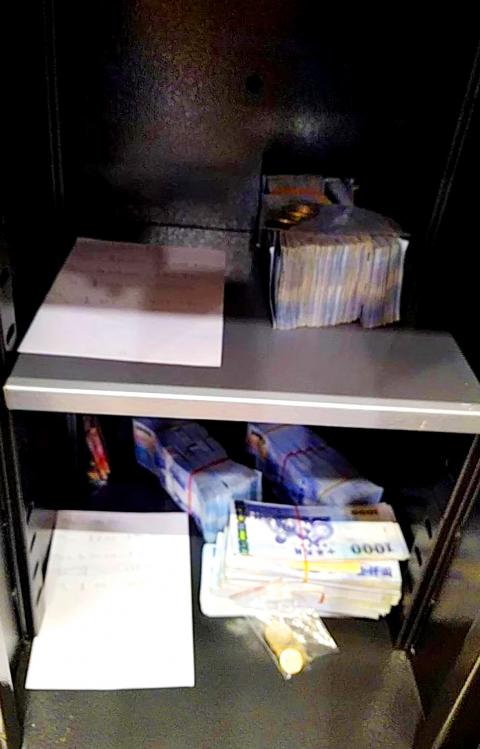Police raids in several cities have closed down a major international gambling syndicate, the largest-known underground bank for remittances between Taiwan and China, and the focus of an ongoing investigation into wagers on the Jan. 11 presidential election.
Investigators said that they on Wednesday detained the suspected backer and proprietor of the syndicate, a 50-year-old man surnamed Hsiao (蕭), who has extensive business and real-estate holdings in Chiayi County and central Taiwan, along with Hsiao’s suspected business partner, a man surnamed Lai (賴), who is in his 40s.
Hsiao, who remains in custody, was subpoenaed along with more than 100 people, including syndicate members, witnesses and regular betting customers, police said, adding that Lai fled to the Philippines, where the syndicate had also established a betting office.

Photo courtesy of the Chiayi District Prosecutors’ Office via CNA
The Chiayi District Prosecutors’ Office, which is coordinating the probe, conducted the raids, gathering evidence and serving subpoenas, with law enforcement units in 72 localities — including Taipei, Chiayi, Taoyuan, Taichung and Kaohsiung.
The case is related to another Chiayi-based underground bank, led by a man surnamed Wu (吳), which in the year prior to an August raid conducted NT$8 billion (US$264.9 million) in money transfers and remittances between Taiwan and China, Chiayi head prosecutor Tsai Ying-chun (蔡英俊) said.
Hsiao was allegedly the “big boss” of Wu’s operation, Tsai said, adding that Hsiao’s syndicate and an affiliated underground bank transferred NT$13.9 billion, mostly from China to Taiwan.
As of yesterday, Chiayi prosecutors had listed Hsiao, Lai and 20 other people as suspects who could be charged with breaches of the Banking Act (銀行法) and the Money Laundering Control Act (洗錢防制法), as well as illegal gambling offenses under the Criminal Code.
The probe is shifting its focus to Hsiao’s China money connection and an election gambling pool that allegedly provides financial and political support from China for Kaohsiung Mayor Han Kuo-yu (韓國瑜), the Chinese Nationalist Party’s (KMT) presidential candidate, Tsai said.
According to a man surnamed Shih (施), who said that he bet on the outcome of the presidential election, the gambling pools favor President Tsai Ing-wen (蔡英文) with a “point spread” — meaning she would lead by that number of votes — of more than 700,000, and up to 1 million in some pools.
However, the house can offer an unreasonably high return to players limiting their wager to Han beating the spread, Shih said, adding that this encourages people to persuade their family and friends to vote for Han so that he hopefully beats the spread, wins the election and makes them rich.
This was allegedly how gambling pools backed by Chinese money helped Han beat former Democratic Progressive Party legislator Chen Chi-mai (陳其邁) in last year’s Kaohsiung mayoral election, as city residents bet NT$1,000 on Han’s victory at even odds and were offered 10 times that in winnings, Shih said.
Wednesday’s raids seized 67 desktop and notebook computers, about 200 cellphones and more than 200 USB drives, as well as NT$5.45 million of local currency and NT$960,000 of foreign currency, six luxury vehicles and 16 diamonds — with the largest one having an estimated value of NT$6 million.

SECURITY: As China is ‘reshaping’ Hong Kong’s population, Taiwan must raise the eligibility threshold for applications from Hong Kongers, Chiu Chui-cheng said When Hong Kong and Macau citizens apply for residency in Taiwan, it would be under a new category that includes a “national security observation period,” Mainland Affairs Council (MAC) Minister Chiu Chui-cheng (邱垂正) said yesterday. President William Lai (賴清德) on March 13 announced 17 strategies to counter China’s aggression toward Taiwan, including incorporating national security considerations into the review process for residency applications from Hong Kong and Macau citizens. The situation in Hong Kong is constantly changing, Chiu said to media yesterday on the sidelines of the Taipei Technology Run hosted by the Taipei Neihu Technology Park Development Association. With

CARROT AND STICK: While unrelenting in its military threats, China attracted nearly 40,000 Taiwanese to over 400 business events last year Nearly 40,000 Taiwanese last year joined industry events in China, such as conferences and trade fairs, supported by the Chinese government, a study showed yesterday, as Beijing ramps up a charm offensive toward Taipei alongside military pressure. China has long taken a carrot-and-stick approach to Taiwan, threatening it with the prospect of military action while reaching out to those it believes are amenable to Beijing’s point of view. Taiwanese security officials are wary of what they see as Beijing’s influence campaigns to sway public opinion after Taipei and Beijing gradually resumed travel links halted by the COVID-19 pandemic, but the scale of

A US Marine Corps regiment equipped with Naval Strike Missiles (NSM) is set to participate in the upcoming Balikatan 25 exercise in the Luzon Strait, marking the system’s first-ever deployment in the Philippines. US and Philippine officials have separately confirmed that the Navy Marine Expeditionary Ship Interdiction System (NMESIS) — the mobile launch platform for the Naval Strike Missile — would take part in the joint exercise. The missiles are being deployed to “a strategic first island chain chokepoint” in the waters between Taiwan proper and the Philippines, US-based Naval News reported. “The Luzon Strait and Bashi Channel represent a critical access

Pope Francis is be laid to rest on Saturday after lying in state for three days in St Peter’s Basilica, where the faithful are expected to flock to pay their respects to history’s first Latin American pontiff. The cardinals met yesterday in the Vatican’s synod hall to chart the next steps before a conclave begins to choose Francis’ successor, as condolences poured in from around the world. According to current norms, the conclave must begin between May 5 and 10. The cardinals set the funeral for Saturday at 10am in St Peter’s Square, to be celebrated by the dean of the College